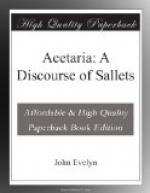35. Limon, Limonia, citrea mala; exceedingly refreshing, Cordial, &c. The Pulp being blended with the Juice, secluding the over-sweet or bitter. See Orange.
36. Mallow, Malva; the curl’d, emollient, and friendly to the Ventricle, and so rather Medicinal; yet may the Tops, well boil’d, be admitted, and the rest (tho’ out of use at present) was taken by the Poets for all Sallets in general. Pythagoras held Malvae folium Sanctisimum; and we find Epimenides in [22]Plato at his Mallows and Asphodel; and indeed it was of old the first Dish at Table: The Romans had it also in deliciis, [23]_Malvae salubres corpori_, approved by [24]_Galen_ and [25]_Dioscorides_; namely the Garden-Mallow, by others the Wild; but I think both proper rather for the Pot, than Sallet. Nonius supposes the tall Rosea, Arborescent Holi-hocks, that bears the broad Flower, for the best, and very [26]_Laxative_; but by reason of their clamminess and Lentor, banished from our Sallet, tho’ by some commended and eaten with Oyl and Vinegar, and some with Butter.
Mercury, Bonus Henricus, English Mercury, or Lapathum Unctuosum. See Blitum.
37. Melon, Melo; to have been reckon’d rather among Fruits; and tho’ an usual Ingredient in our Sallet; yet for its transcendent delicacy and flavor, cooling and exhilarating Nature (if sweet, dry, weighty, and well-fed) not only superior all the Gourd-kind, but Paragon with the noblest Productions of the Garden. Jos. Scaliger and Casaubon, think our Melon unknown to the Ancients, (which others contradict) as yet under the name of Cucumers: But he who reads how artificially they were Cultivated, rais’d under Glasses, and expos’d to the hot Sun, (for Tiberius) cannot well doubt of their being the same with ours.
There is also a Winter-Melon, large and with black Seeds, exceedingly Cooling, brought us from abroad, and the hotter Climates, where they drink Water after eating Melons; but in the colder (after all dispute) Wine is judg’d the better: That it has indeed by some been accus’d as apt to corrupt in the Stomach (as do all things else eaten in excess) is not deny’d: But a perfect good Melon is certainly as harmless a Fruit as any whatsoever; and may safely be mingl’d with Sallet, in Pulp or Slices, or more properly eaten by it self, with a little Salt and Pepper; for a Melon which requires Sugar to commend it, wants of Perfection. Note, That this Fruit was very rarely cultivated in England, so as to bring it to Maturity, till Sir Geo. Gardner came out of Spain. I my self remembring, when an ordinary Melon would have been sold for five or six Shillings. The small unripe Fruit, when the others are past, may be Pickl’d with Mango, and are very delicate.




